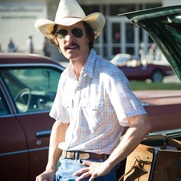
The Academy Awards are tonight, and as usual, I've only managed to see a few of the films nominated for the main prizes. But as much as I enjoyed Gravity (thrilling and touching), American Hustle (highly entertaining), Blue Jasmine (Hawkins was fun, Blanchett was mesmerizing), and The Lego Movie (no nominations? really?)—and as much as I want to see others, especially 12 Years a Slave—I will be rooting for Jean-Marc Vallée's Dallas Buyers Club this evening.
For one thing, it turns out Matthew McConaughey is not just a pretty boy after all. In fact, he's not even that pretty in this one, having dropped quite a bit of weight for his role. As it happens, the guy can actually act, something that fans of HBO's True Detective have been trying to tell me. And as good as McConaughey is, Jared Leto is even better. I'd be happy to see both men walk away with Oscars.
Great performances are not the only reason I'll be cheering for Dallas Buyers Club, though. I don't want to give away anything specific, in case you've managed to remain as clueless about the film's content as I was going in. But if you're anything like me, it will make you laugh, it will bring more than one tear to your eye—and it will make you seethe at the brazenly unjust machinations of the powers that be.
And as much as technology has thankfully progressed since the late 1980s, when the film is set, the politics of the matter have changed little. The villains of the piece (and their counterparts in other countries) still arrogate to themselves the legal right to tell you what you can and cannot do, even when the only person you risk harming is yourself—and even when the risk of doing nothing is arguably the greater one.
Great performances are not the only reason I'll be cheering for Dallas Buyers Club, though. I don't want to give away anything specific, in case you've managed to remain as clueless about the film's content as I was going in. But if you're anything like me, it will make you laugh, it will bring more than one tear to your eye—and it will make you seethe at the brazenly unjust machinations of the powers that be.
And as much as technology has thankfully progressed since the late 1980s, when the film is set, the politics of the matter have changed little. The villains of the piece (and their counterparts in other countries) still arrogate to themselves the legal right to tell you what you can and cannot do, even when the only person you risk harming is yourself—and even when the risk of doing nothing is arguably the greater one.